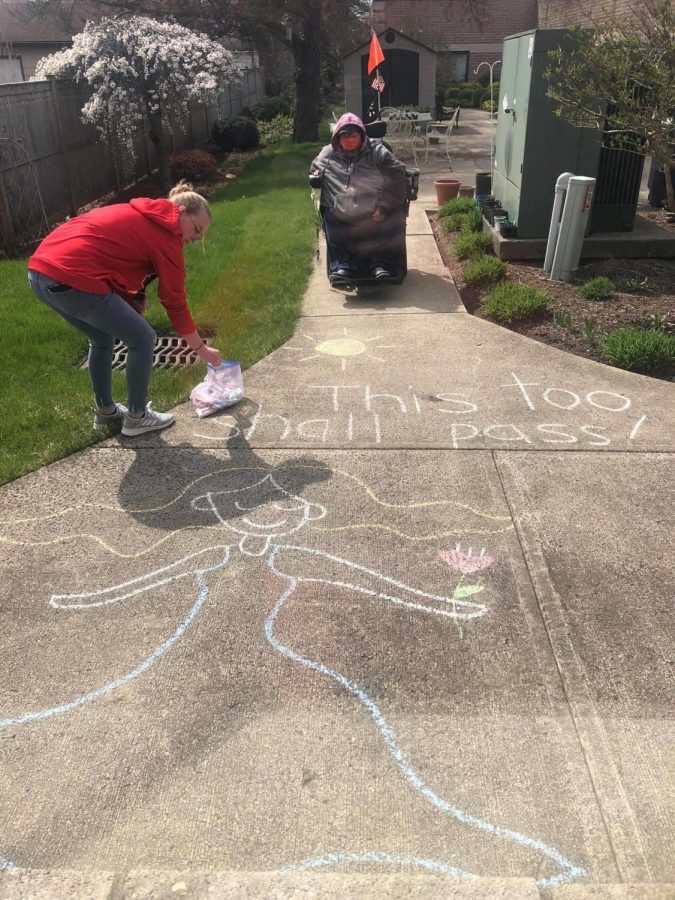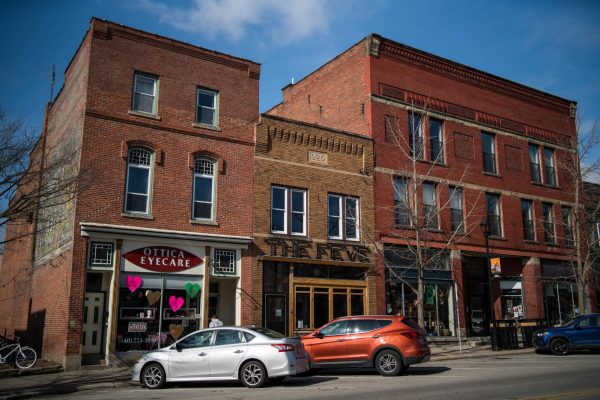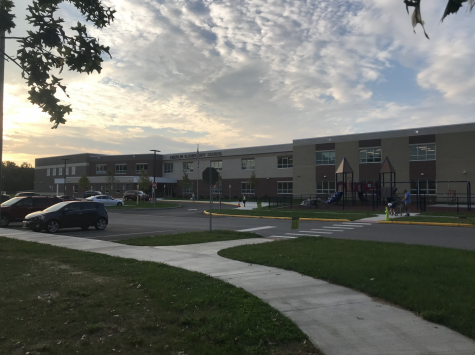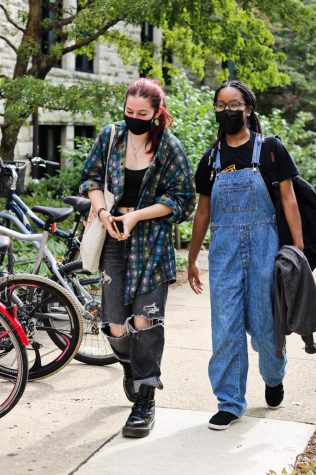Local Retirement, Nursing Homes Cope with Pandemic Challenges
Courtesy of Welcome Nursing Home
A community member created a chalk walk at Welcome Nursing Home to boost morale during a time of social distancing.
Local senior living centers Kendal at Oberlin and Welcome Nursing Home confirmed this week that no staff or residents at either establishment have tested positive for COVID-19. Both began closing their campuses before Ohio Governor Mike DeWine’s stay-at-home order was enacted on March 23, and have continuously updated their protocols to ensure the safety of their communities over the past month.
Welcome Nursing Home caters specifically to elders in need of care services and medical plans. Kendal’s campus houses some residents in the Stephens Care Center facilities and others in apartments or cottages. Both facilities, like all nursing and retirement homes across the country, face the unique challenge of having an at-risk population in relatively close quarters.
Welcome Nursing Home began restricting visitors in mid-March, and later expanded restrictions to limit the inter-facility movement of residents and staff. Kendal at Oberlin has taken similar measures.
“Before the Governor mandated things being shut down, we had already done it,” Kendal at Oberlin CEO Barbara Thomas wrote in an email to the Review. “We closed such spaces as our exercise center, dining rooms, hair salon, pool and auditorium events.”
Welcome has also worked to minimize contact for residents who need daily care.
“We have reassigned staff members to be the unit activity person or the unit restorative [state tested nurse assistant],” said Vice President of Wessell Generations, Inc. and Director of Quality Assurance Heidi J. W. Freas. “Instead of people traveling throughout the building, we’ve tried to minimize the number of contacts a resident will have in a day.”
Staff at Welcome have taken advantage of opportunities for medical appointments and consultations to happen through video calls, rather than transporting compromised individuals to hospitals for medical concerns. Psychotherapy and psychiatric appointments have also transitioned online.
To ensure more rigorous safety measures, both establishments have required staff to regularly monitor their temperatures and respond to health evaluations when coming to work. Social distancing is observed during necessary staff meetings, and Kendal has implemented a rotation strategy, alternating working weeks for staff to allow employees who can work from home to do so.
With the exception of Kendal’s lifeguards after the pool’s closure, neither facility has furloughed or laid off employees.
“Kendal at Oberlin does not lay off staff members, instead reassigning those whose usual offerings are not available during the pandemic to serve in areas where they are needed,” Thomas wrote.
Administration at Welcome explained that they are, in fact, actively hiring due to preemptive concerns about a potential health crisis. The 1135 waiver granted by the Center for Medicare and Medicaid Services and the Ohio Department of Health has authorized them to offer a modified State Tested Nurse Aide class in order to train more workers and alleviate potential burdens on their staff.
“Projections showed that 20–40 percent of our staff at some point could be out because of being COVID-positive themselves,” Freas explained. “So in preparation for that concern and potential crisis, we are actually hiring staff and training them and getting them oriented to our building, residents, and processes. … We are still trying to bring in good, qualified healthcare providers.”
Both facilities have prepared for the possibility of an outbreak.
“[Kendal has] set up a Pandemic Wing exclusively for any COVID-19 confirmed cases,” Thomas wrote. “It is totally equipped and would be served by a dedicated staff, completely separate from other care areas to avoid cross-contamination.”
Increased need for personal protective equipment — including masks, gloves, and hand sanitizer — has become a significant expense.
“The cost of those things has really skyrocketed,” said Wessell Generations, Inc. President & Treasurer and Welcome Nursing Home Administrator Jill D. Herron. Recently, 20 count boxes of masks were selling for $135 each. Acquiring isolation gowns and face shields has required innovative solutions on the part of Welcome staff, who have turned to Amish communities and labs that are producing equipment to donate or making them available for order.
“When we did our analysis on PPE, our costs [have gone] up by about one thousand percent,” Herron added.
When Kendal placed a large order of gloves for multiple homes they collaborated with Welcome Nursing Home and sold them a portion of the supplies. Some protective equipment has been nearly impossible to buy in numbers below the thousands, according to Welcome staff.
COVID-19 has presented other financial challenges for senior care facilities. Short term care for patients recovering from surgeries is often a central part of nursing home operations, a service which has recently seen a sharp decline in demand. Since the state has suspended elective surgeries, intake of post-acute care and short-term rehab patients at facilities like Kendal and Welcome slowed nearly to a stop beginning as early as February. While these surgeries will resume again on May 1 following DeWine’s announcement today, their suspension has meant a loss in revenue.
Kendal reported to be well-positioned financially prior to the Ohio outbreak, but they are preparing for possible difficulties in the future that could include a drop in enrollment.
“We have been able to adapt some of our marketing using ‘virtual’ tools and techniques in order to keep the pipeline open and engaging with our key stakeholders during the pandemic,” Thomas wrote. “We do anticipate that there could be an impact on future occupancy levels and continue to look for innovative ways to market Kendal to mitigate the overall impact on Kendal’s financial position.”
Liz Burgess, who chairs Kendal at Oberlin’s Board of Directors, worries that media around the development of COVID-19 may contribute to the sometimes negative reputation of senior care centers.
“The old stereotype of nursing homes as unsafe places — I hope [COVID-19 coverage] doesn’t reinforce that or bring that back up,” Burgess said. “At least the nursing homes that I’m familiar with in Oberlin are incredibly high-quality and focus on the quality of life of the individuals in those homes.”
Burgess lauded the senior care community’s efforts, and Kendal’s specifically, during this challenging time.
“The staff has been diligent in preparing for that eventuality [of a potential COVID-19 case on campus], and we’ve had the board committee overseeing that process,” she explained. “Board, staff, and residents have been really adaptive because they understand the risks involved.”
In addition to appointing a Resident Engagement Coordinator, The Kendal at Oberlin Residents’ Association has made a second in-house television channel available with programming to come, including broadcasted lectures. On their existing channel, a member of the fitness staff has been teaching brief daily exercise classes.
KORA has also recruited resident volunteers to assist in grocery distribution to cottages across their campus, with supplies delivered by staff from IGA, Walmart, and their kitchen. All three of Kendal’s cafeterias are closed, and while most residents have opted to receive their usual allotted meals in their rooms, others have forgone that portion of their bill in favor of purchasing groceries and cooking.
“While we’re very concerned about the pandemic and what it’s doing to our culture, we do feel very well cared for here,” said Gary Olin, president of KORA.
Through Kendal’s regularly circulating publication, Olin has called for a Staff Appreciation Appeal this spring in addition to the normal bonuses residents organize in June and December, to express gratitude to staff. Residents have also vocalized their appreciation by making funny posters that feature affirmations for employees.
The staff at Welcome have created a gift shop on wheels, socially-distanced Bingo, and community-sponsored ice cream carts.
“The team is doing a great job trying to think of ways to keep spirits high,” Freas said.
Technology has been instrumental in maintaining morale, allowing residents to connect with their family members and neighbors in this isolated moment. Residents can play games and connect with outside volunteers. For those who might have difficulty working with technology, staff members in both facilities are on hand to assist.
“In the Stephens Care Center, we have staff that can work directly with those who have devices and just need help,” wrote Michele Tarsitano, the director of Creative Arts Therapy at Kendal. “For those living in the Cottages/Apartments … we have done phone calls and tried to walk people through [problems], or have had them come with masks on and bring their device to the Heiser Community area, where a staff person can help … work through a technical issue.”
Participation from the greater Oberlin community has bolstered some of the creative solutions staff have created to keep residents engaged. Staff at both Kendal and Welcome cited the efforts of local organizations and individuals as integral to boosting resident morale.
“I appreciate our local Oberlin community adding things for everyone in Oberlin to partake in, [for] example the Oberlin Unitarian Universalists Fellowship offering meditation groups on Zoom, the professors of Oberlin College who are running Zoom creative writing groups that include Kendal, the local businesses helping us work through how to get groceries and [over-the-counter] items that our community needs,” Tarsitano wrote. “I am so proud to be a part of solutions to this challenge.”





